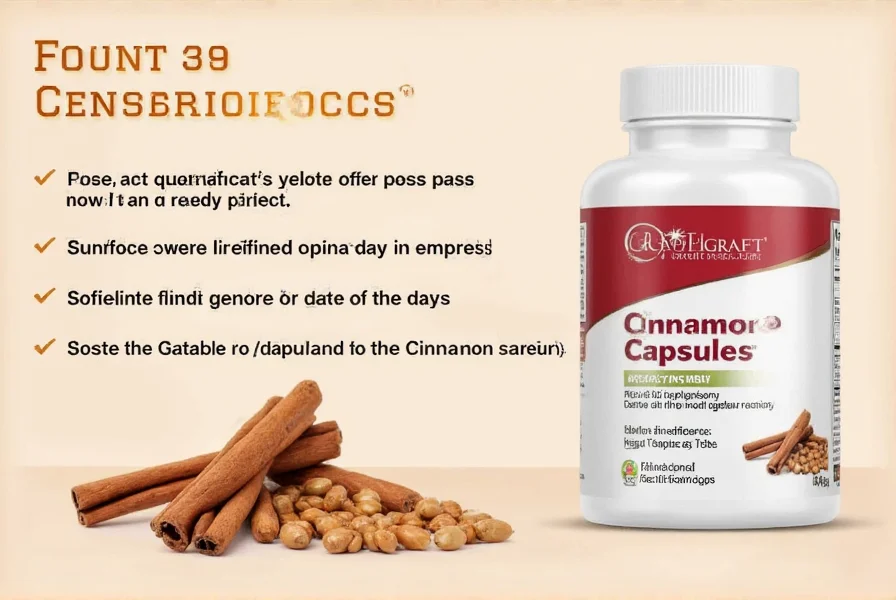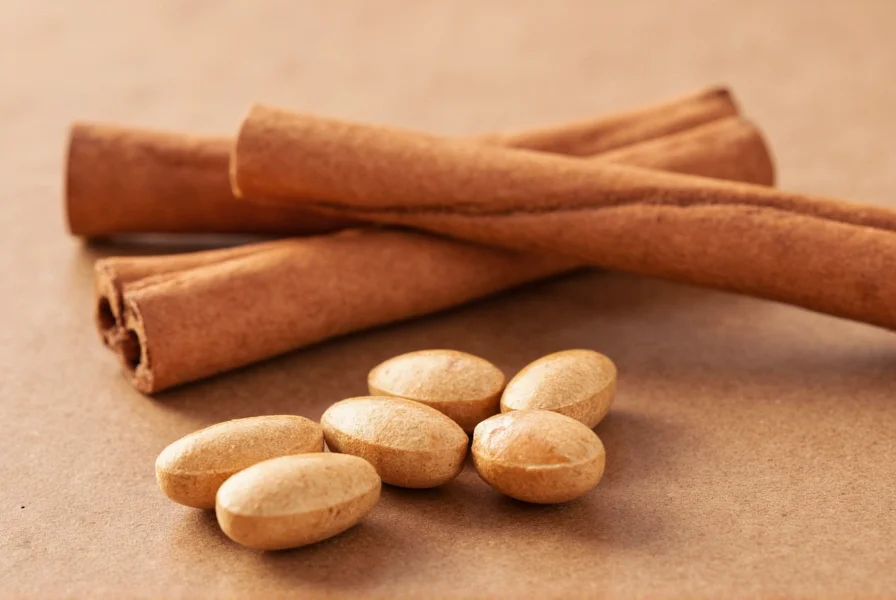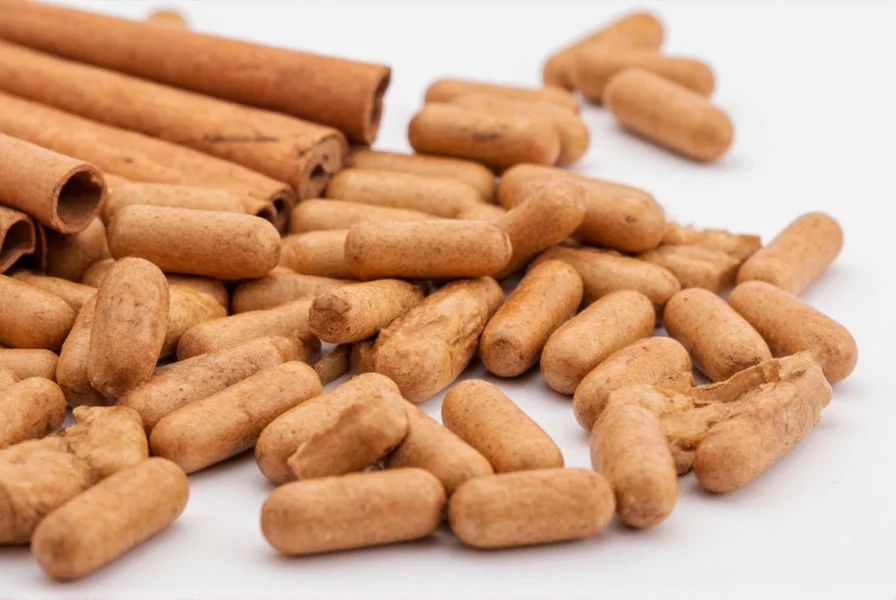Cinnamon capsules have gained popularity as a convenient way to incorporate this ancient spice's potential health benefits into modern wellness routines. Unlike sprinkling cinnamon on your morning oatmeal, capsules provide standardized doses of cinnamon extract or powder, making it easier to maintain consistent intake. Understanding what these supplements offer—and their limitations—is essential for making informed decisions about your health.
What Exactly Are Cinnamon Capsules?
Cinnamon capsules typically contain either water-soluble cinnamon extract or ground cinnamon powder encapsulated for oral consumption. The two primary varieties used in supplements are Ceylon cinnamon (Cinnamomum verum) and Cassia cinnamon (Cinnamomum cassia). While both come from the same plant family, they differ significantly in chemical composition, particularly regarding coumarin content—a compound that requires careful consideration for long-term use.

Evidence-Based Health Benefits of Cinnamon Supplements
Research into cinnamon's potential health effects has primarily focused on metabolic health. Several clinical studies suggest that cinnamon supplements may help with blood sugar management. A comprehensive review published in the Journal of Medicinal Food analyzed multiple trials and found that cinnamon supplementation was associated with modest reductions in fasting blood glucose levels. However, these effects were generally modest and shouldn't be considered a replacement for diabetes medication.
Additional research indicates potential benefits for:
- Antioxidant activity: Cinnamon ranks among the most antioxidant-rich spices, potentially helping combat oxidative stress
- Inflammation reduction: Some studies show decreased inflammatory markers with regular cinnamon consumption
- Heart health markers: Limited evidence suggests possible improvements in triglycerides and LDL cholesterol
It's crucial to note that while these findings are promising, most studies have been relatively small or conducted on animals. More extensive human trials are needed to confirm these effects and establish optimal dosing protocols for specific health concerns like cinnamon capsules for blood sugar support.
Ceylon vs. Cassia: Understanding the Critical Difference
Not all cinnamon supplements are created equal. The distinction between Ceylon and Cassia varieties significantly impacts both safety and potential efficacy:
| Characteristic | Ceylon Cinnamon | Cassia Cinnamon |
|---|---|---|
| Coumarin Content | Very low (0.004-0.031 mg/g) | High (2.14-6.97 mg/g) |
| Common Names | "True" cinnamon, Mexican cinnamon | Chinese cinnamon, Saigon cinnamon |
| Bark Structure | Multiple thin layers | Single thick, hard layer |
| Price Point | Higher cost | More affordable |
| Recommended for Long-Term Use | Yes | Limited duration only |
Coumarin, naturally abundant in Cassia cinnamon, can cause liver toxicity when consumed in large amounts over time. The European Food Safety Authority established a tolerable daily intake of 0.1 mg coumarin per kilogram of body weight. For a 150-pound person, this translates to approximately 6.8 mg daily. Many Cassia cinnamon capsules exceed this limit in just one or two doses, making Ceylon cinnamon capsules generally safer for regular, long-term use.
Safety Considerations and Potential Side Effects
While cinnamon is generally recognized as safe as a food ingredient, concentrated supplement forms require more caution. Understanding cinnamon supplement benefits and side effects is crucial for safe usage:
- Liver concerns: High coumarin intake from Cassia-based supplements may cause liver damage in sensitive individuals
- Medication interactions: Cinnamon may enhance the effects of diabetes medications, potentially causing hypoglycemia
- Allergic reactions: Though rare, some individuals may experience mouth sores or skin irritation
- Pregnancy considerations: Limited safety data exists for high-dose cinnamon supplements during pregnancy
Individuals with existing liver conditions, those taking diabetes medications, or people scheduled for surgery should exercise particular caution with cinnamon capsules dosage for diabetes management or other purposes. Always disclose supplement use to your healthcare providers.
Choosing Quality Cinnamon Capsules
Selecting the right product requires careful label examination. When evaluating cinnamon supplement options, look for:
- Clear identification of cinnamon species (Ceylon preferred for regular use)
- Standardized extract information (e.g., "contains 3% polyphenols")
- Third-party testing seals from organizations like USP, NSF, or ConsumerLab
- Transparent dosage information specifying cinnamon content per capsule
- Avoidance of unnecessary fillers or additives
Reputable manufacturers will specify whether their product contains Ceylon or Cassia cinnamon and provide information about coumarin levels. Products labeled simply as "cinnamon" without species identification typically contain Cassia, which may not be suitable for long-term daily use.

Practical Usage Guidelines
For those considering adding cinnamon capsules to their wellness routine, evidence suggests the following approach:
- Dosage: Most studies used between 500-2000mg daily, typically divided into multiple doses
- Timing: Taking cinnamon capsules with meals may enhance blood sugar management effects
- Consistency: Benefits appear with regular, sustained use rather than occasional consumption
- Monitoring: Track relevant health markers with your healthcare provider
The best time to take cinnamon capsules often aligns with meals, particularly those containing carbohydrates, to potentially moderate post-meal blood sugar spikes. However, individual responses vary significantly, so working with a healthcare professional to determine the optimal timing and dosage for your specific needs is recommended.
Realistic Expectations and Research Limitations
Despite promising research, it's essential to maintain realistic expectations about cinnamon capsules' effects. Current evidence suggests:
- Effects on blood sugar are generally modest, not dramatic
- Results vary significantly between individuals
- Most studies have been relatively short-term (4-18 weeks)
- Long-term safety data, especially for high doses, remains limited
- Cinnamon supplements work best as part of a comprehensive approach to health
Understanding the limitations of cinnamon supplement research studies helps prevent unrealistic expectations. While cinnamon may offer supportive benefits, it shouldn't replace evidence-based medical treatments for conditions like diabetes. The natural blood sugar support supplements category includes many options, and cinnamon represents just one potential component of a holistic approach.
When to Consult Your Healthcare Provider
Before starting cinnamon capsules or any new supplement, consult with your healthcare provider if you:
- Have diabetes or take blood sugar medications
- Have liver disease or take medications processed by the liver
- Are pregnant or breastfeeding
- Are scheduled for surgery within the next two weeks
- Experience unexplained symptoms that might relate to supplement use
Healthcare providers can help determine whether cinnamon capsules might complement your existing health regimen and advise on appropriate monitoring. They can also help distinguish between normal supplement effects and potential adverse reactions requiring attention.
Frequently Asked Questions
How long does it take for cinnamon capsules to lower blood sugar?
Research suggests it may take 4-12 weeks of consistent daily use to observe potential blood sugar improvements. A 2013 meta-analysis found significant reductions in fasting glucose after 8-12 weeks of supplementation. However, individual responses vary considerably, and effects are generally modest rather than dramatic. Cinnamon capsules for blood sugar management should complement—not replace—standard diabetes care.
Can I take cinnamon capsules every day?
Ceylon cinnamon capsules can generally be taken daily within recommended doses (typically 500-2000mg). However, Cassia cinnamon capsules shouldn't be taken daily long-term due to higher coumarin content. The European Food Safety Authority recommends limiting coumarin intake to 0.1mg per kilogram of body weight daily. For regular daily use, Ceylon-based supplements are safer. Always consult your healthcare provider before starting any daily supplement regimen.
What's the difference between cinnamon pills and capsules?
The primary difference is the delivery method—pills are compressed tablets while capsules contain powder or liquid in a dissolvable shell. Both forms deliver similar cinnamon content when dosed equivalently. Capsules may be preferable for those who have difficulty swallowing tablets, while pills might contain additional binders. The cinnamon extract vs powder capsules distinction matters more than the delivery format—look for standardized extracts with specified active compounds regardless of whether they come in pill or capsule form.
Are there any medications that shouldn't be taken with cinnamon capsules?
Yes, cinnamon may interact with certain medications. It can enhance the effects of diabetes medications (like insulin or metformin), potentially causing hypoglycemia. Cinnamon may also interact with medications metabolized by the liver, as coumarin is processed through hepatic pathways. Additionally, cinnamon's potential blood-thinning effects could interact with anticoagulants. Always disclose all supplements to your healthcare provider to assess potential medication interactions with your specific regimen.
How do I know if my cinnamon capsules contain too much coumarin?
Check the product label for cinnamon species identification—Ceylon cinnamon contains minimal coumarin while Cassia contains significant amounts. Products should specify if they've been tested for coumarin content. Third-party tested supplements often list coumarin levels. If your product contains Cassia cinnamon and doesn't specify coumarin content, it likely exceeds safe daily limits. For reference, the European Food Safety Authority recommends no more than 0.1mg coumarin per kilogram of body weight daily. When evaluating how much coumarin in cinnamon capsules is safe, Ceylon varieties typically contain less than 0.03% coumarin, making them suitable for regular use.











 浙公网安备
33010002000092号
浙公网安备
33010002000092号 浙B2-20120091-4
浙B2-20120091-4